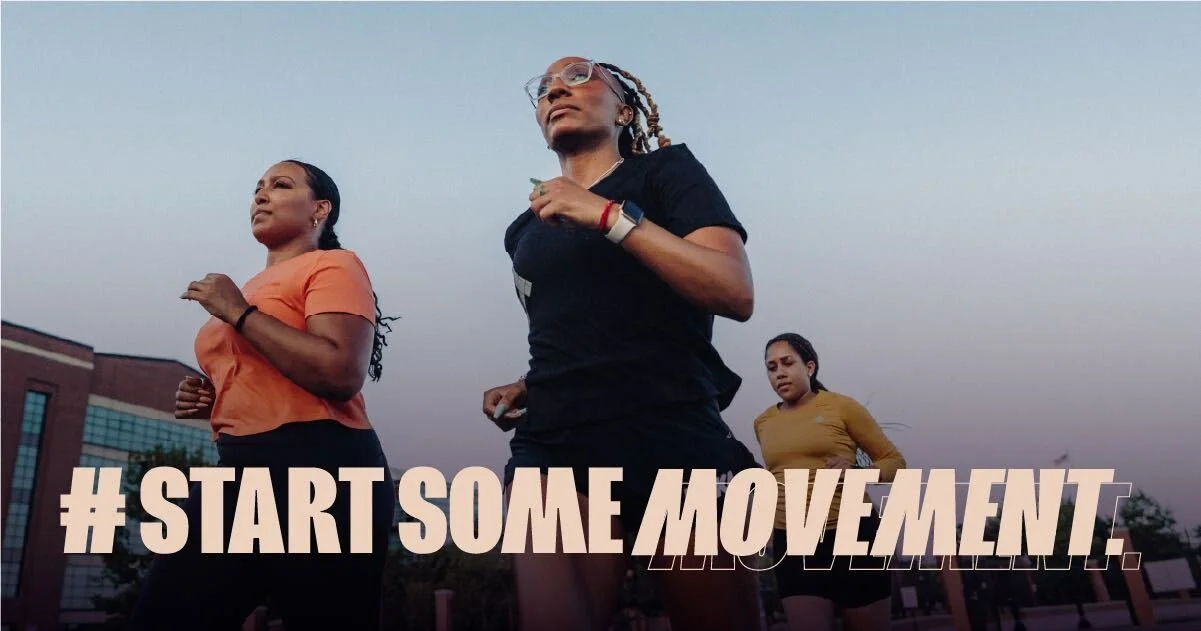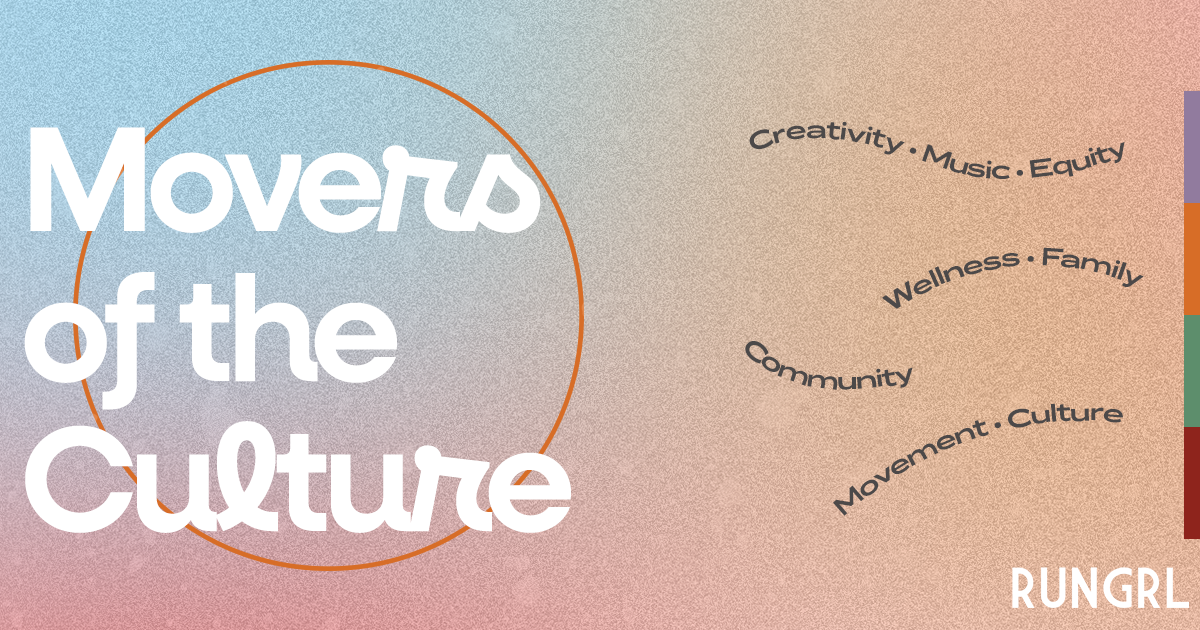A Legacy of Movement - Passing the Baton of Healthy Routines
Photos: Jahaira Dixon for RUNGRL
by Sherese Parris, Contributor
When Beyoncé asked, "Who runs the world?", it felt like an anthem we could all get behind. We have always known that Black women in particular hold a special place in the shaping of global culture. Whether it’s our uncanny sense of style or appetite for entrepreneurship, our ability to inspire radical change is nothing short of magical.
In today's socially driven world, this #BlackGirlMagic has led to more Black women millionaires, CEOs and change agents than ever before. We’re expanding our footprint across industries, building legacies in business, innovation, travel and beyond, working hard to pass down generational wealth to our loved ones.
Yet, there is one key piece that is often missing from the conversation of the legacies we create as women: the gift of generational health.
Culturally, Black women are known for the legacies we pass down in the form of family stories, recipes, skills and family traditions. It is important, then, that we consider our families’ legacies of movement to be just as embedded in our culture.
Building Healthy Habits to Fight Disparities
Compared to their white counterparts, African Americans are generally at higher risk for heart diseases, stroke, cancer, and diabetes, according to the Office of Minority Health. These health disparities aren’t new, and yet, they continue to have a major impact on the health of generations of Black families.
While most people know that engaging in physical movement can have significant health benefits such as improving blood pressure, lowering the risks of heart disease and certain cancers, many still need help learning to apply the habits of movement as a regular part of their lives. A recent study from the Centers for Disease Control and Prevention shows 73 percent of adults (20+ years old) in the US are overweight or obese with 60 percent of children and youth (ages 2-19) landing in the same category. When a family decides to spend a Saturday afternoon on the jogging trail it sparks healthier overall habits while reducing the risks of developing physical ailments.
According to the CDC, “Approximately half of U.S. adults have a chronic disease that is related to inadequate diet quality and physical activity, including type 2 diabetes, cardiovascular diseases, or obesity.” Coupled with good nutrition, a physical activity, like running, is paramount to creating a healthy environment for the body. This means making a choice to prioritize movement.
Black women matriarchs are known for leading the charge when it comes to the habits practiced within the Black family. Many life-changing habits are formed during childhood and develop as children grow into young adults, eventually passing their health habits down to their own children. Creating such a legacy means leading with intention.
Creating Your Own Legacy
Following more than two years of Covid restrictions, dramatic, life-altering events and overall stress, many individuals and families today find themselves searching for a reset. Whether you’ve fallen back from a regular routine or found yourself more stuck in a sedentary lifestyle, it may have felt easy to put your health and wellness at the bottom of the priority list. One of the easiest ways to snap out of this rut is to get up and get moving.
Experience new things together. Whether it’s going for a family run around the block or roller skating at a local park, friends and families can use this time to make new discoveries about their town, meet neighbors and experience new things together.
For many of us, trying a new sport can feel daunting, especially if it's an activity that seems to require particular skills. However, bringing along a loved one can ease your nerves and open the door for new opportunities and conversation. The community people find in running is one of the greatest examples of this.
Remember that you’re making history. Black women have been the voice of reason, hope and change–both in their families and in the world–for centuries. Often, when it comes to outdoor sports such as hiking, trail running, cycling or even skiing, Black women and other underrepresented groups may not be shown in media and magazines. But that doesn’t mean we aren’t here. As we consciously choose to take up space outside, we are claiming the pieces of nature that belong to us, along with all of their restorative properties. We have the ability to shift the conversation and there is no better time than now to start moving in that direction.
When RUNGRL spoke to a group of Black women concerning their connection to fitness and family for our Legacy of Movement project, Gail Robinson, 69, said,”There are lots of sports and activities we are often excluded from as Black people. I think if we had more consciousness or exposure [when I was younger], I may have done more things like hiking and skiing.”
Build on the power of cultural connections. From the past to the present, Black people have celebrated their innate ability to move as an act of rebellion. From group dances at the family reunion to the latest tiktok trends started by Black creators, these traditions that can be traced back to the indigineous tribes of Africa are more than just a good dance party. In fact, when groups and families engage in physical movement together, the intergenerational bond becomes embedded into the normal cycle of families, and opportunities to enrich the lives of future generations become possible.
Remember that movement is mental. While the old saying, “Black don’t crack,” may be true on the outside, the perils of stress and trauma that have affected Black women can cause signs of early aging on the inside. A Study of Women's Health Across the Nation estimated that at ages 49–55, black women are 7.5 years biologically “older” than white women. Indicators of perceived stress and poverty account for 27% of this difference. That means that “U.S. Blacks may be biologically older than whites of the same chronological age due to the cumulative impact of repeated exposure to and high-effort coping with stressors.”
Knowing how these mental effects take a toll on the body, it is important to combat the effects of stress by participating in daily exercise rituals like running, jogging or walking. Though gym memberships and group fitness classes are excellent ways to stay fit, they can often cost a pretty penny. That is one of the reasons RUNGRL uses running as vehicle to wellness–because of its accessibility.
A recent study conducted by Black Women’s Health Imperative reported, “[Black women] who made the least money got the greatest health benefit from one simple, cheap, healthy exercise: walking.” The endorphins from walking and running can transmit feelings of joy, calm and even euphoria, and are the first step to combatting these negative effects of stress. Families who workout together can even experience group catharsis, a release of emotional energy that can lead to healing.
Take your time. The journey towards better health and wellness is a personal one, and it’s important to remember that this race is a marathon, not a sprint. It can be tempting to want to go full speed ahead, but building out your personal wellness plan at your own pace is important for long term commitments. By pacing yourself, you can be prepared for the hurdles life throws at you and keep pushing forward.
Just as Black women are known for passing down information and habits through storytelling, holiday traditions and even shared family recipes, each of us has an opportunity to pass on the legacy of movement. It’s up to you to decide what that legacy will be.
This article is part of the Legacy of Movement campaign, in partnership with HOKA , to celebrate the power of family and legacy in the health and wellness of Black women and our families. Read more and watch the video.
Sherese Parris
Contributor
Sherese Parris is an athlete, former track and field runner, competitive cheer coach and yoga enthusiast. A graduate of the Royal Central School of Speech and Drama in London with a Masters in Contemporary Acting, her passion for the arts has led her into careers in Entertainment, Media and the Arts. Sherese is the host of fufear, a podcast highlighting artists and entrepreneurs who are chasing their dreams despite obstacles and fears.
When she is not working, you can find her traveling the globe to find the world's best vegan restaurants.








